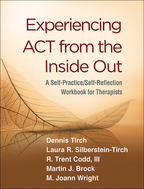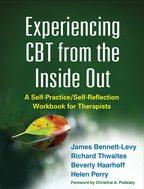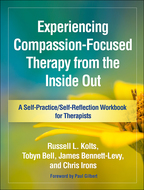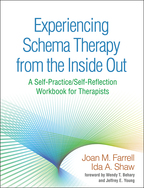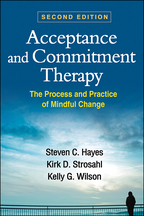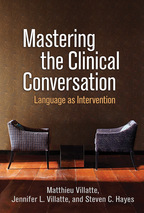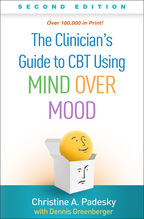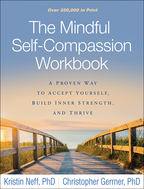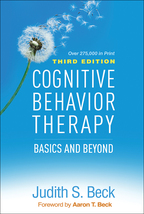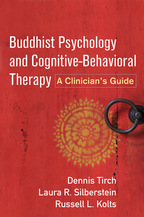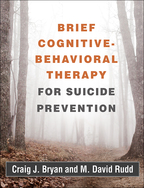Experiencing ACT from the Inside Out
A Self-Practice/Self-Reflection Workbook for Therapists
Dennis Tirch, Laura R. Silberstein-Tirch, R. Trent Codd III, Martin J. Brock, and M. Joann Wright
HardcoverPaperbacke-bookprint + e-book
Hardcover
orderSeptember 2, 2019
ISBN 9781462540655
Price: $74.00 256 Pages
Size: 8" x 10½"
Paperback
orderSeptember 3, 2019
ISBN 9781462540648
Price: $49.00256 Pages
Size: 8" x 10½"
Sign up for emails on upcoming titles on Mindfulness (with special discounts)!
“This book is compassionate, insightful, experiential, and sure to supercharge your use of acceptance- and mindfulness-based cognitive behavior therapies. I found it to be both nourishing and thought-provoking….I have long been a fan of Dennis Tirch and his colleagues, and this was a sublime and deeply pleasant experience. I highly recommend the book”

—Advances in Cognitive Therapy Newsletter
“The deep message of this book is that therapists are human beings too. Like our clients, we therapists thrive when we are better able to think freely, feel fully, and focus on bringing meaning and purpose into our lives. This book shows how ACT can be used to guide that journey. Instead of just 'talking the talk,' this book asks us as clinicians to 'walk the walk'—to apply the change processes targeted by ACT to challenges we face. Increasing our psychological flexibility is important not just for ourselves, but also for our clients.”

—Steven C. Hayes, PhD, Foundation Professor of Psychology Emeritus, University of Nevada, Reno; originator and co-developer of Acceptance and Commitment Therapy
“Thoughtfully structured, the book immerses readers in experiential learning, which is essential to competent and skilled use of ACT. Numerous exercises for clinicians to try 'from the inside out' are coupled with gentle and wise guidance from the authors. This book is a 'must have' for clinicians and clinical training programs interested in making a profound difference in the lives of those they serve.”

—Lisa W. Coyne, PhD, Department of Psychiatry, Harvard Medical School; Director, New England Center for OCD and Anxiety
“ACT therapists strive to intentionally and open-heartedly contact the pain, challenge, and joy that characterize mindful, values-consistent living. Cultivating this stance—an essential ACT competency—is both deeply transformational and challenging. Experiencing ACT from the Inside Out provides a roadmap for novice ACT therapists, seasoned practitioners hoping to deepen their practice, and experienced trainers guiding new therapists in their development. Informed by the growing research demonstrating the benefits of SP/SR on therapist skills, and their personal experiences as ACT therapists and trainers, the authors have produced a much-needed guide that students, clinicians, and educators will find invaluable.”

—Susan M. Orsillo, PhD, Department of Psychology, Suffolk University
“I recommend this compassionate, thoughtful book to all psychotherapists interested in developing their ACT clinical skills. As an experiential and process-based intervention, ACT is not simply taught to clients, it is shared with them. This kind of shared relating requires the clinician not only to understand theory and technique, but to be fully present and alive in deeply personal therapeutic interactions. SP/SR is a superb method for doing the kind of personal work needed to embody ACT—to support clients in creating personal meaning and making values-based change.”

—Robyn D. Walser, PhD, private training, consultation, and psychotherapy practice, Menlo Park, California; Co-Director, Bay Area Trauma Recovery Clinic
“Self-reflection is a vital part of effectively using acceptance-based strategies in clinical practice. In this engaging, practice-based workbook, expert ACT clinicians provide an in-depth exploration of the approach. Both novice and experienced clinicians will benefit from the many exercises and the vulnerable, human examples provided by the authors.”

—Lizabeth Roemer, PhD, Department of Psychology, University of Massachusetts Boston
—Advances in Cognitive Therapy Newsletter
“The deep message of this book is that therapists are human beings too. Like our clients, we therapists thrive when we are better able to think freely, feel fully, and focus on bringing meaning and purpose into our lives. This book shows how ACT can be used to guide that journey. Instead of just 'talking the talk,' this book asks us as clinicians to 'walk the walk'—to apply the change processes targeted by ACT to challenges we face. Increasing our psychological flexibility is important not just for ourselves, but also for our clients.”
—Steven C. Hayes, PhD, Foundation Professor of Psychology Emeritus, University of Nevada, Reno; originator and co-developer of Acceptance and Commitment Therapy
“Thoughtfully structured, the book immerses readers in experiential learning, which is essential to competent and skilled use of ACT. Numerous exercises for clinicians to try 'from the inside out' are coupled with gentle and wise guidance from the authors. This book is a 'must have' for clinicians and clinical training programs interested in making a profound difference in the lives of those they serve.”
—Lisa W. Coyne, PhD, Department of Psychiatry, Harvard Medical School; Director, New England Center for OCD and Anxiety
“ACT therapists strive to intentionally and open-heartedly contact the pain, challenge, and joy that characterize mindful, values-consistent living. Cultivating this stance—an essential ACT competency—is both deeply transformational and challenging. Experiencing ACT from the Inside Out provides a roadmap for novice ACT therapists, seasoned practitioners hoping to deepen their practice, and experienced trainers guiding new therapists in their development. Informed by the growing research demonstrating the benefits of SP/SR on therapist skills, and their personal experiences as ACT therapists and trainers, the authors have produced a much-needed guide that students, clinicians, and educators will find invaluable.”
—Susan M. Orsillo, PhD, Department of Psychology, Suffolk University
“I recommend this compassionate, thoughtful book to all psychotherapists interested in developing their ACT clinical skills. As an experiential and process-based intervention, ACT is not simply taught to clients, it is shared with them. This kind of shared relating requires the clinician not only to understand theory and technique, but to be fully present and alive in deeply personal therapeutic interactions. SP/SR is a superb method for doing the kind of personal work needed to embody ACT—to support clients in creating personal meaning and making values-based change.”
—Robyn D. Walser, PhD, private training, consultation, and psychotherapy practice, Menlo Park, California; Co-Director, Bay Area Trauma Recovery Clinic
“Self-reflection is a vital part of effectively using acceptance-based strategies in clinical practice. In this engaging, practice-based workbook, expert ACT clinicians provide an in-depth exploration of the approach. Both novice and experienced clinicians will benefit from the many exercises and the vulnerable, human examples provided by the authors.”
—Lizabeth Roemer, PhD, Department of Psychology, University of Massachusetts Boston

